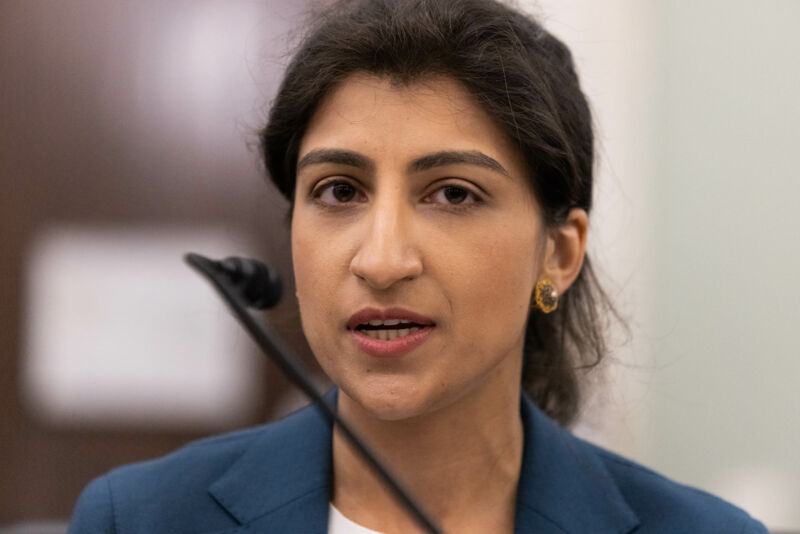
President Joe Biden named Lina Khan chair of the Federal Trade Commission just hours after her confirmation in the Senate as one of the agency's five commissioners. It’s an unusual move—newly nominated commissioners are seldom elevated to chair immediately—and it likely signals that the Biden administration will be taking a hawkish approach to antitrust enforcement, particularly when it comes to Big Tech platform companies like Google, Amazon, Facebook, and Apple.
Though Khan is certain to take a harsher view on platforms, the FTC is unlikely to begin dismantling Big Tech tomorrow. “Lina Khan has pushed the academic conversation on tech, and now she has to push the agenda at the FTC,” Shane Greenstein, a professor at Harvard Business School, told Ars. “A lot of the day to day at the FTC has little to do with tech, and a lot of the agenda is just not up to the chairman. It comes inbound from consumer complaints, merger proposals, etc. It will be interesting to see how she manages that—and with a divided Congress. That just has to be challenging.”
While she may have a rocky trail ahead of her, Khan’s confirmation vote of 69-28 was relatively straightforward by modern standards. Her nomination was expected as far back as early March, but her elevation to chair came as a surprise. “If you walk back through the modern or earlier history of the FTC, I can’t remember an instance where the White House has named an individual to be a commissioner, then once that person was confirmed by the Senate, designated that person to be the chair,” William Kovacic, former FTC chair, said to Axios.Swift rise
As a law student four years ago, Khan published a highly influential paper that recast the debate over anticompetitive behavior, particularly among Big Tech firms. In the paper, titled “Amazon’s Antitrust Paradox,” Khan argued that using prices as the primary gauge of anticompetitive behavior was an insufficient measure of market power among certain firms, particularly Big Tech companies and their platforms.
The risks are twofold, she said. “First, the economics of platform markets create incentives for a company to pursue growth over profits, a strategy that investors have rewarded. Under these conditions, predatory pricing becomes highly rational—even as existing doctrine treats it as irrational and therefore implausible,” Khan wrote. “Second, because online platforms serve as critical intermediaries, integrating across business lines positions these platforms to control the essential infrastructure on which their rivals depend.” Those two qualities of today’s platforms have also allowed Big Tech companies to collect data on rivals, putting the rivals in uncompetitive positions.
As chair, Khan will have control of the agency’s agenda and staff. Her investigations won’t have unlimited scope—she has to enforce the laws on the books, of course. But those laws could change—and soon.
Proposed legislation
Last week, members of both parties in the House of Representatives introduced five bills that, if passed, would represent the most sweeping overhaul of antitrust law in the US since the trust-busting era of the late 19th and early 20th centuries. And earlier this year, Sen. Amy Klobuchar (D-Minn.) and Sen. Josh Hawley (R-Mo.) each proposed very different pieces of legislation that address antitrust reform. Klobuchar’s bill would boost resources for antitrust enforcement, expand the scope of unlawful behavior, and shift the burden of proof in merger cases to companies. Hawley’s bill was less nuanced, mainly focusing on market cap as a proxy for market dominance.Of the recent bills, the ones that could have the most immediate impact would sharply raise merger filing fees, which go toward funding FTC and Department of Justice antitrust enforcement.
The remainder of the House bills focus on platforms and their potential for anticompetitive behavior. You can see Khan’s influence in those bills. The Ending Platform Monopolies Act would forbid large platforms from owning or operating lines of business, like app stores or ad exchanges, that would push the platforms to favor their own services over a competitor's. Another, the American Choice and Innovation Online Act, would similarly prevent platforms from favoring their own products and services, but it would also make it illegal for them to use private data to disadvantage competitors.
Even if those bills don’t pass, they may still push antitrust enforcement in the direction the legislators are moving. “Historically, there has always been this dance between the Congress, the legislative branch, and the agencies in the executive branch where some of what legislators are doing is threatening to change legislation, and some of it is they do actually change legislation,” Greenstein said. “And some of what they do is hold hearings to try to persuade agencies to move in the direction the legislation would have gone had it passed—and therefore eliminate the need to do that in the first place.
“In antitrust, that dance is more than 100 years old,” he added.
Article From & Read More ( Lina Khan, Big Tech skeptic, named FTC chair mere hours after confirmation - Ars Technica )https://ift.tt/3wytZmH
Business
Bagikan Berita Ini















0 Response to "Lina Khan, Big Tech skeptic, named FTC chair mere hours after confirmation - Ars Technica"
Post a Comment